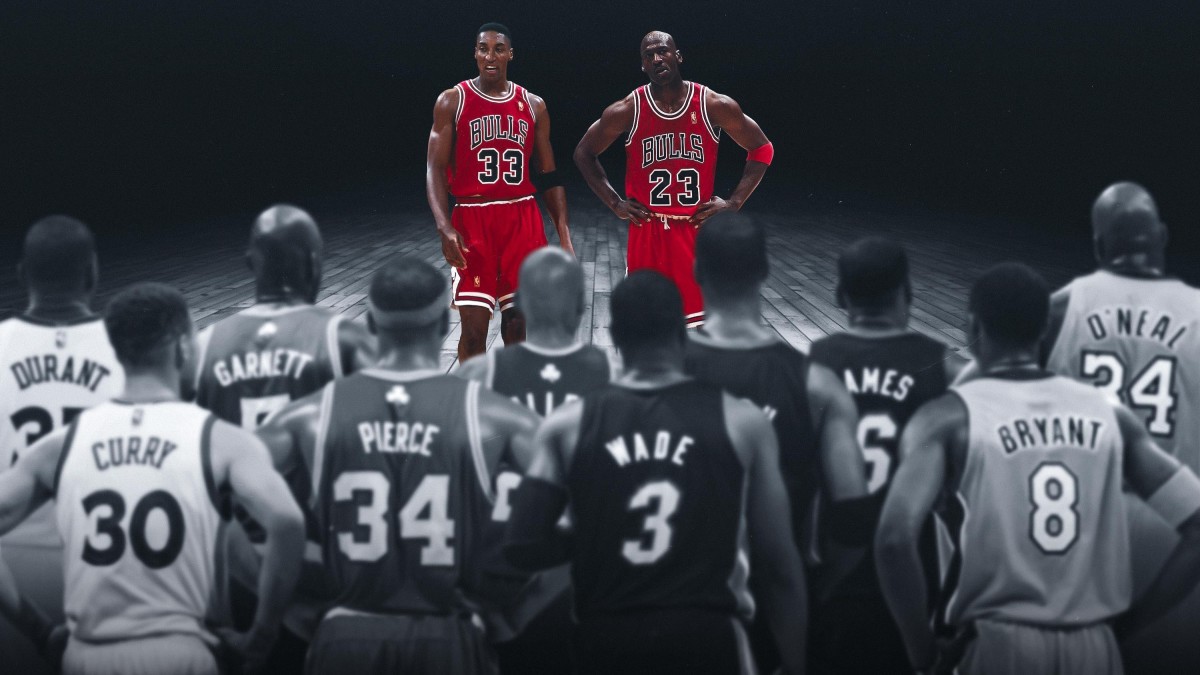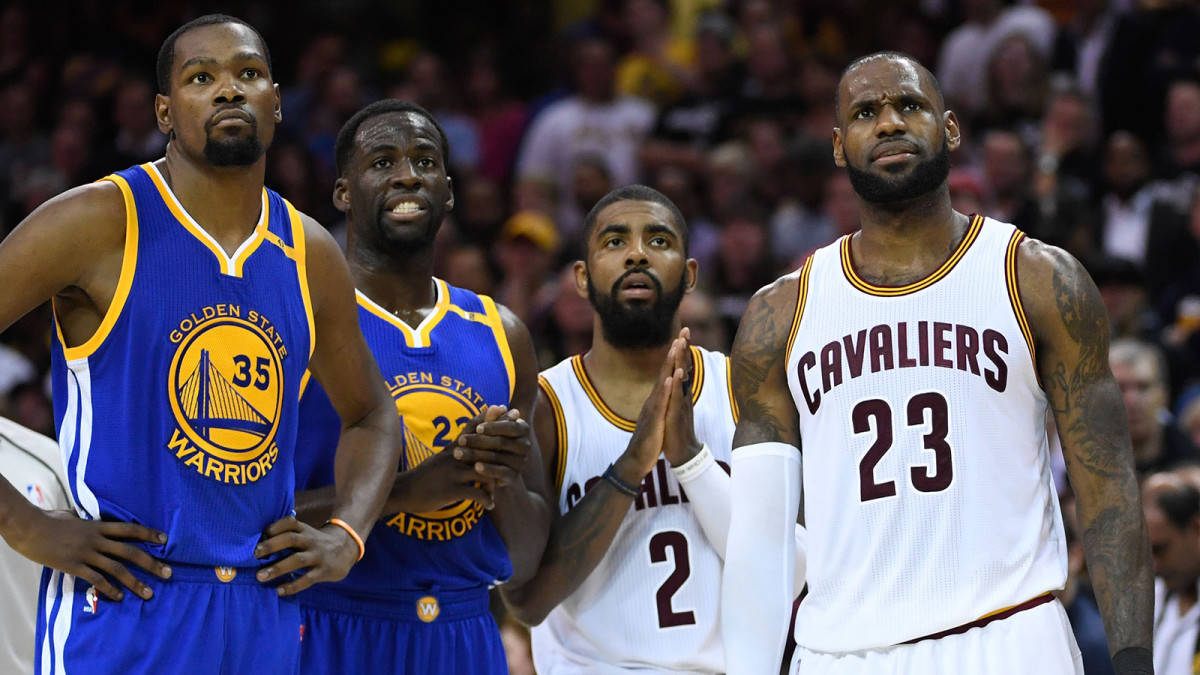Could Michael Jordan's Bulls Lose to Any NBA Champions of the 2000s?
We’ve been devoid of live games for over a month now due to the NBA’s coronavirus suspension, and fans have been turning back the clock with classic contests as they wait for the 2019-20 season to resume. And the throwback obsession reached a fever pitch on Sunday night. ESPN’s documentary The Last Dance has transported NBA fans throughout the nation back to the 1990s, with Michael Jordan’s dominance on full display more than two decades after his second retirement. The next four Sundays will be chock full of Jordan highlights as we roll through April without the playoffs.
The Last Dance has spurred no shortage of conversation, including comparisons between Jordan’s Bulls and some of the other greatest champions in NBA history. Could Jordan have defeated Shaq and the Lakers? Would Steph Curry’s Warriors have dethroned his Airness? Let’s dive into a time machine and examine the matchup between Jordan’s Bulls and the greatest Finals winners of the 2000s (apologies to the 2011 Mavericks and numerous Spurs teams).

Los Angeles Lakers (2000-01)
While it never reared its ugly head in the Finals, the lack of an impact center hindered the Bulls in spurts throughout the Jordan era. Hakeem Olajuwon feasted against Chicago across the 1990s, and Shaquille O’Neal and the Magic defeated the Bulls in the 1995 playoffs. Fast forward six years later, and O’Neal may be in good position to take down the Bulls again.
O’Neal’s 2001 playoffs is downright laughable upon further examination. The Big Diesel averaged 30.4 points and 15.4 rebounds per game, shooting 55% percent from the floor. He recorded back-to-back 40-point, 20-rebound performances in Game 1 and Game 2 of the Western Conference semifinals. He absolutely destroyed Dikembe Mutumbo in the Finals. Perhaps no player at his peak has ever been better equipped to end the Bulls’ dynasty.
Los Angeles’ center was far from a one-man-band, too. Kobe Bryant led the Lakers in scoring in 2000-01, and Horace Grant, Ron Harper and Robert Horry headlined an impressive supporting cast. The Lakers ranked No. 21 in defensive rating in 2000-01, a puzzling figure for one of the best teams in league history. But a 16–1 playoff record is hard to argue against. At their best, O’Neal’s squad could certainly give the Bulls a run for their money.
Boston Celtics (2007-08)
66 wins, the NBA’s best defense and a Hall-of-Fame Big Three is a pretty good formula to square off against the Bulls, and Doc Rivers previously matched with with Phil Jackson in the 2008 and 2010 Finals. And this matchup would be a true throwback battle. The Celtics carried themselves with a physicality and swagger unmatched throughout the league in 2007-08, a quality that can largely be attributed to Kevin Garnett. Don’t expect Garnett and the Celtics to back down, even against the greatest dynasty in the modern era.
The Bulls wouldn’t be able to mentally stymie the Ubuntu Celtics, though it’s tough to envision Boston’s defensive personnel stopping Jordan and Scottie Pippen. The Celtics weren’t exactly long and athletic on the wing in 2007-08, with a hefty share of minutes devoted to James Posey and Eddie House. Perhaps Tony Allen sees a big minutes boost given the opponent, but his offensive limitations were severe in his third season, even more so than during his Memphis tenure. Expect another tough battle, but Boston’s roster outside the Big Three will ultimately fall short against MJ.
Miami Heat (2012-13)
This is probably the first 2000s team with a legitimate chance against Jordan and the Bulls, and such a matchup would make for a thrilling comparison. Both teams are led by elite wings, and neither team has a notable true center. Even Chris Bosh has a worthy opponent given Tony Kukoc’s rise in the final years of the 1990s. If we’re looking to settle the GOAT conversation once and for all, placing the 2012-13 Heat against the 1997-98 Bulls is probably our best bet.
LeBron James was arguably at the peak of his powers in 2012-13, shooting a blistering 60.2% on two-pointers while canning 40.6% of threes. And while this year doesn’t feature the best version of Wade, he still averaged nearly 20 points per game in the Finals. You can count on Miami’s dynamic duo to deliver, though its lack of depth may prove to be the death knell against Chicago. Shane Battier and Udonis Haslem were at the end of their runs as rotation players in 2013-14., There’s a bit too much reliance on Norris Cole for my liking.
This isn’t to say Chicago’s rotation was stacked in 1997-98, though its top seven players were as sturdy as any unit in NBA history. A team needs to be deep and versatile to take down Jordan’s Bulls. Miami falls just short in our potential matchup.
San Antonio Spurs (2013-14)
It was frankly hard to choose which Spurs squad would be the best to square off against Jordan and the Bulls, and the 2006-07 team has a case as the top squad of the Gregg Popovich era. Perhaps Manu Ginobili was a bit long in the tooth by 2013-14, but the addition of Kawhi Leonard vaults this Popovich team over the top.
San Antonio exacted its revenge on the Heat with a barrage of threes in the 2014 Finals, with the Spurs’ ball movement mirroring that of the early 70s Knicks. And the Spurs would have to continue to milk their three-point advantage to take down Jordan and the Bulls. Marco Belinelli, Danny Green and Patty Mills were all marksmen in 2013-14. Boris Diaw found the fountain of youth in San Antonio. With Duncan in the later stages of his career, San Antonio’s perimeter prowess is their best chance against the Bulls.
But despite the dominant Finals performance, it’s difficult to imagine the 2013-14 Spurs taking down Jordan and Co. Tony Parker was the team’s lone All-NBA selection with a second-team honor. Duncan was no longer a dominant force despite his impressive efficiency. Perhaps an amalgam of previous Spurs teams could have taken down Jordan. Pair peak Duncan, Parker and Ginobili with David Robinson, and a kingslayer appears. But it’s hard to find any single Spurs team that could defeat MJ.

Cleveland Cavaliers (2015-16)
LeBron and Kyrie Irving slayed one historic team in the 2016 Finals. Could they do it again against Jordan’s Bulls? I remain skeptical. Cleveland’s roster falls well short in the depth test, with significant minutes going to Matthew Dellavedova and an end-of-career Richard Jefferson. And despite his dominance in the Finals, Irving could struggle against Chicago’s stifling defense. On the other end, the Bulls would endlessly hunt Cleveland’s point guard, with a slate of screens devised to switch Irving onto Jordan or Scottie Pippen. The Cavs’ title was incredibly satisfying, though it took a certain set of conditions to come to fruition. Don’t expect LeBron and Kyrie to topple the Bulls with the 2015-16 Cavaliers roster.
Golden State Warriors (2016-17)
Forget dynamic duos, the 2016-17 Warriors sported five likely Hall-of-Famers, including two of the best 20 players in NBA history. Golden State won 67 games and dropped just one playoff game in the first year of the Kevin Durant era, and the Warriors barely broke a sweat in a Finals win over LeBron, Kyrie Irving and the Cavaliers. Steve Kerr’s team has a fair case as the best in basketball history.
Could the Bulls contain Golden State’s dominant three-point attack? There’s some reason for hope. Curry has struggled in spurts against long defenders throughout his career (namely vs. Memphis in the 2015 playoffs) and Chicago could take advantage with either Jordan or Pippen on the two-time MVP. But even if you assign the other Bulls’ star to Kevin Durant, Klay Thompson emerges as a sort of basketball whack-a-mole.
Andre Iguodala wasn’t quite washed in the 2017 Finals. Ditto for Shaun Livingston. Even Draymond Green looked downright spry in 2017 compared to his 2020 self. Perhaps Jordan and the Bulls could win this potential matchup through sheer will and determination. But compare the two rosters, and Jordan clearly faces an uphill battle. The 2016-17 Warriors were a super-team we’ve never before seen. We may never watch such a dominant group again.
Toronto Raptors (2018-19)
The reigning champions sported a roster stocked with quality players, and Kawhi Leonard reached his offensive apex in the 2019 playoffs. Watching peak Kawhi vs. Jordan would be a delight. But the one-on-one battle may be closer than the actual series. The 2018-19 Raptors lacked a true second star (considering this series is before Pascal Siakam’s leap into stardom), and they relied heavily on their pair of diminutive point guards. The talent gap is too much to overcome for Leonard against Jordan’s Bulls.
